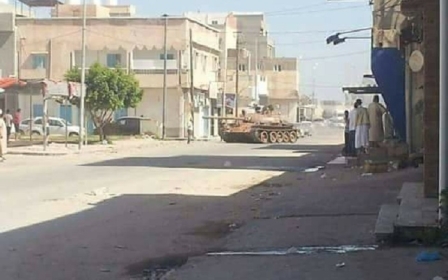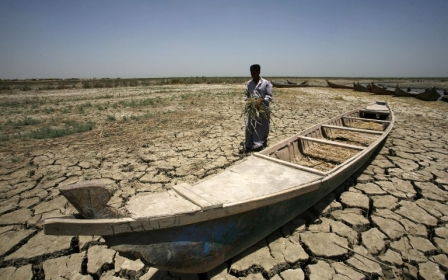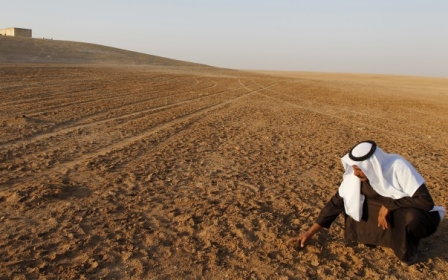Libya afflicted by power cuts amid deadly heatwave

Cities in the west of Libya were plunged into darkness on Friday as the General Electricity Company (GECOL) reported a total blackout lasting as long as 20 hours in some cities.
The blackout came as a heatwave continued to sweep across the country with temperatures reaching higher than 47C (117F) in the capital Tripoli. The cuts were caused by a faulty power station, GECOL said.
Libya has been mired in a continuous state of war since of the overthrow of Muammar Gaddafi in 2011 amid the revolution that arose during the Arab Spring. The country has been hit often by power cuts in recent years, as unrest continues across the country.
GECOL blamed this blackout specifically on an overload of power use and sent a text message to citizens requesting their “cooperation”. However, in many areas, power control rooms were attacked by armed militias attempting to restore electricity to their towns and cities.
While many cities have seen electricity return to some degree, the cuts continued throughout Saturday and Sunday with only short periods of power in many areas. Since Thursday, the western region of the country has had intermittent power, with some areas enduring as many as six cuts daily, some lasting as long as eight hours.
Libya currently has three separate centres of political power. The lack of one centralised government has allowed unrest and civil disarray to flourish. The reasons for the cuts are many: managerial and financial corruption within GECOL, the weakness of the grid and negligence of it among them.
The lack of awareness of both public and private sectors on how to efficiently use electricity during times of crisis is also a problem.
With temperatures soaring above the norm for this time of year, the effect of the blackout has been worst for the most vulnerable members of the community, as more than air conditioning is disrupted. In many areas, water distribution in homes requires electricity, so along with heat and darkness some have had to endure a lack of running water.
Premature infants at risk
This recurring phenomenon has claimed many lives in recent years, with newborns, especially those born prematurely, often falling victim. Incubators are crucial for the wellbeing of these infants and with many hospitals lacking their own private generators, the reality for many during lengthy power cuts such as this one, is death.
In addition to infants and children requiring constant medical attention, the elderly are also some of the most affected.
“The heat is causing my mother to weaken and she’s had a fever on and off for days. She is 90 years old, this is not fair,” a resident told MEE as she pressed a damp compress to her mother’s forehead.
A family living in the Injeela district of Tripoli have now been without electricity and water for five days. “The electricity comes for an hour or so, we get very excited to have running water, and to be able to put the air conditioning on and then before we know it it’s gone again,” one member said.
Those suffering from diabetes and high blood pressure also struggle with the soaring temperatures. Without access to air conditioning or somewhere cool to store medication, the danger increases greatly.
It is common to find medication that has become dangerous to consume amid its exposure to high temperatures. With no running water added to the problem, the difficulty of dealing with fevers or open wounds that need to be kept clean and cool is multiplied.
Patients suffering from asthma who use nebulizers and oxygen machines to ease breathing also need electricity in order to continue using them.
In addition to the medical ramifications, when the power goes out, mobile-phone and internet signals vanish, inhibiting communication. In addition, electronic devices have been damaged from the random and frequent bursts of electricity or the lack thereof, which have become common occurrences in most cities.
Regular and unannounced cuts such as last week’s blackout have also contributed to the inflation of food prices across the country. With fridges, freezers and other coolers constantly losing power, food waste has increased, forcing traders to increase stock prices to compensate for losses.
Aisha, living in al-Serraj, told MEE of the struggle she faces when trying to shop for her family: “Everything is 10 times the price it used to be, and on top of that we can’t get our money out of the bank. Even an ice cream for the kids to cool off is now” about four times more expensive than before. “It has become unbearable.”
Meats and dairy products have perhaps been the worst affected by the power cuts, as they depend on cooling systems to remain edible.
“The food waste caused in the past five days of major power cuts has been phenomenal, with temperatures above 45C, the average citizen’s daily requirements including food, medicines and other necessities have been impossible to provide,” a Tripoli resident, Mostafa, told MEE.
Stay informed with MEE's newsletters
Sign up to get the latest alerts, insights and analysis, starting with Turkey Unpacked
Middle East Eye delivers independent and unrivalled coverage and analysis of the Middle East, North Africa and beyond. To learn more about republishing this content and the associated fees, please fill out this form. More about MEE can be found here.




